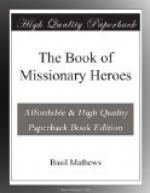These young men, Sabat and Abdallah, the sons of notable Arab chiefs, had struck up a great friendship. Now, each in company with his chum, they were together at the end of the greatest journey that an Arab can take.
As the first faint flush of pink touched the mountain beyond Mecca, the cry came from the minaret: “Come to prayer. Prayer is better than sleep. There is no God but Allah.”
Sabat and Abdallah were already up and out, and that day they said the Mohammedan prayer before the Kaaba itself with other pilgrims who had come from many lands—from Egypt and Abyssinia, from Constantinople and Damascus, Baghdad and Bokhara, from the defiles of the Khyber Pass, from the streets of Delhi and the harbour of Zanzibar.
We do not know what Abdallah looked like. He was probably like most young Arab chieftains, a tall, sinewy man—brown-faced, dark-eyed, with hair and a short-cropped beard that were between brown and black.
His friend Sabat was, however, so striking that even in that great crowd of many pilgrims people would turn to look at him. They would turn round, for one reason, because of Sabat’s voice. Even when he was just talking to his friend his voice sounded like a roar; when he got excited and in a passion (as he very often did) it rolled like thunder and was louder than most men’s shouting. As he spoke his large white teeth gleamed in his wide mouth. His brown face and black arched eyebrows were a dark setting for round eyes that flashed as he spoke. His black beard flowed over his tawny throat and neck. Gold earrings swung with his agitation and a gold chain gleamed round his neck. He wore a bright silk jacket with long sleeves, and long, loose-flowing trousers and richly embroidered shoes with turned-up toes. From a girdle round his waist hung a dagger whose handle and hilt flashed with jewels.
Abdallah and Sabat were better educated than most Arabs, for they could both read. But they were not men who could stay in one place and read and think in quiet. When they had finished their worship at Mecca, they determined to ride far away across the deserts eastward, even to Kabul in the mountains of Afghanistan. So they rode, first northward up the great camel-route toward Damascus, and then eastward. In spite of robbers and hungry jackals, through mountain gorges, over streams, across the Syrian desert from oasis to oasis, and then across the Euphrates and the Tigris they went, till they had climbed rung by rung the mountain ranges that hold up the great plateau of Persia.
At last they broke in upon the rocky valleys of Afghanistan and came to the gateway of India—to Kabul. They presented themselves to Zeman Shah, the ruler of Afghanistan, and he was so taken with Abdallah’s capacity that he asked him to be one of his officers in the court. So Abdallah stayed in Kabul. But the restless, fiery Sabat turned the face of his camel westward and rode back into Persia to the lovely city of Bokhara.




